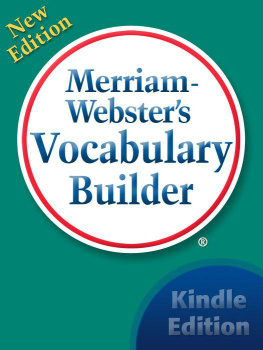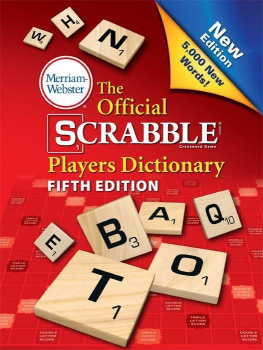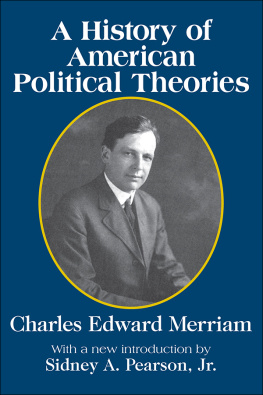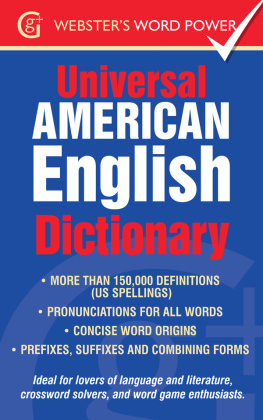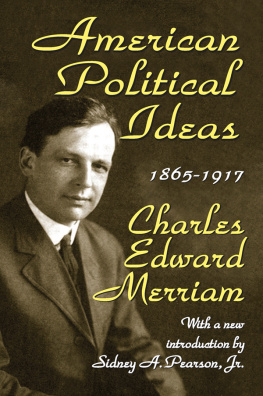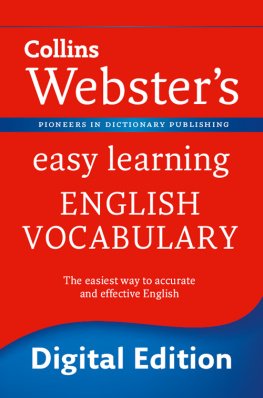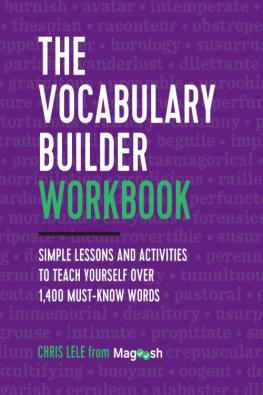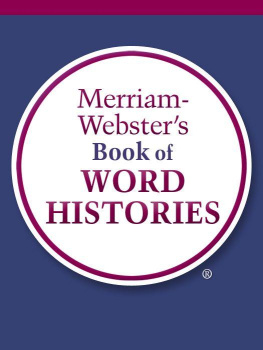Merriam-Webster - Merriam-Websters Vocabulary Builder
Here you can read online Merriam-Webster - Merriam-Websters Vocabulary Builder full text of the book (entire story) in english for free. Download pdf and epub, get meaning, cover and reviews about this ebook. year: 2010, publisher: Merriam-Webster, Inc., genre: Children. Description of the work, (preface) as well as reviews are available. Best literature library LitArk.com created for fans of good reading and offers a wide selection of genres:
Romance novel
Science fiction
Adventure
Detective
Science
History
Home and family
Prose
Art
Politics
Computer
Non-fiction
Religion
Business
Children
Humor
Choose a favorite category and find really read worthwhile books. Enjoy immersion in the world of imagination, feel the emotions of the characters or learn something new for yourself, make an fascinating discovery.
- Book:Merriam-Websters Vocabulary Builder
- Author:
- Publisher:Merriam-Webster, Inc.
- Genre:
- Year:2010
- Rating:3 / 5
- Favourites:Add to favourites
- Your mark:
- 60
- 1
- 2
- 3
- 4
- 5
Merriam-Websters Vocabulary Builder: summary, description and annotation
We offer to read an annotation, description, summary or preface (depends on what the author of the book "Merriam-Websters Vocabulary Builder" wrote himself). If you haven't found the necessary information about the book — write in the comments, we will try to find it.
Merriam-Websters Vocabulary Builder — read online for free the complete book (whole text) full work
Below is the text of the book, divided by pages. System saving the place of the last page read, allows you to conveniently read the book "Merriam-Websters Vocabulary Builder" online for free, without having to search again every time where you left off. Put a bookmark, and you can go to the page where you finished reading at any time.
Font size:
Interval:
Bookmark:

Merriam-Webster, Incorporated
Springfield, Massachusetts

A GENUINE MERRIAM-WEBSTER
The name Webster alone is no guarantee of excellence. It is used by a number of publishers and may serve mainly to mislead an unwary buyer.
Merriam-Webster is the name you should look for when you consider the purchase of dictionaries or other fine reference books. It carries the reputation of a company that has been publishing since 1831 and is your assurance of quality and authority.
Copyright 2010 by Merriam-Webster, Incorporated
Merriam-Webster's Vocabulary Builder, Second Edition .
ISBN 978-0-87779-795-1
All rights reserved. No part of this work covered by the copyrights hereon may be reproduced or copied in any form or by any meansgraphic, electronic, or mechanical, including photocopying, recording, taping, or information storage and retrieval systemswithout written permission of the publisher.
to the Second Edition
Merriam-Webster's Vocabulary Builder is designed to achieve two goals: (1) to add a large number of words to your permanent working vocabulary, and (2) to teach the most useful of the classical word-building roots to help you continue expanding your vocabulary in the future.
To achieve these goals, Merriam-Webster's Vocabulary Builder employs an original approach that takes into account how people learn and remember. Some vocabulary builders simply present their words in alphabetical order; some provide little or no discussion of the words and how to use them; and a few even fail to show the kinds of sentences in which the words usually appear. But memorizing a series of random and unrelated things can be difficult and time-consuming. The fact is that we tend to remember words easily and naturally when they appear in some meaningful context, when they've been shown to be useful and therefore worth remembering, and when they've been properly explained to us. Knowing precisely how to use a word is just as important as knowing what it means.
Greek and Latin have been the sources of most of the words in the English language (the third principal source being the family of Germanic languages). All these words were added to the language long after the fall of the Roman empire, and more continue to be added to this day, with most new wordsespecially those in the sciencesstill making use of Greek and Latin roots. A knowledge of Greek and Latin roots will not only help you remember the meanings of the words in this book but will help you guess at the meanings of new words that you run into elsewhere. Remember what a root means and you'll have at least a fighting chance of understanding a word in which it appears.
The roots in this book are only a fraction of those that exist, but they include almost all the roots that have produced the largest number of common English words. All these roots (sometimes called stems ) formed parts of Greek and Latin words. Some are shown in more than one form (for example, CRAC/CRAT), which means that they changed form in the original language, just as buy and bought are forms of the same English word.
Each of the more than 250 roots in this book is followed by four words based on the root. Each group of eight words (two roots) is followed by two quizzes. Every fifth group of words is a special eight-word section which may contain words based on classical mythology or history, words borrowed directly from Greek or Latin, or other special categories of terms. Each set of 40 words makes up a unit. Thus, the 30 units in the book discuss in detail a total of 1,200 words. In addition, the brief paragraphs discussing each word include in italics many words closely related to the main words. So mastering a single word (for example, compel ) can increase your vocabulary by several words (in this case, compelling, compulsion, and compulsive ).
The words presented here aren't all on the same level of difficultysome are quite simple and some are truly challengingbut the great majority are words that could be encountered on the SAT and similar standardized tests. Most of them are in the vocabularies of well-educated Americans, including professionals such as scientists, lawyers, professors, and doctors. Even the words you feel familiar with may only have a place in your recognition vocabularythat is, the words you recognize when you see or hear them but don't actually use in your own speech and writing.
Each main word is followed by its most common pronunciation. Any pronunciation symbols unfamiliar to you can be learned easily by referring to the Pronunciation Symbols table on page vii.
The definition comes next. We've tried to provide only the most common senses or meanings of each word, in simple and straightforward language, and no more than two definitions of any word are given. (A more complete range of definitions can be found in a college dictionary such as Merriam-Webster's Collegiate Dictionary .)
An example sentence marked with a bullet () follows the definition. This sentence by itself can indicate a great deal about the word, including the kind of sentence in which it often appears. It can also serve as a memory aid; when you meet the word in the future, you may recall the example sentence more easily than the definition.
An explanatory paragraph rounds out each entry. The paragraph may do a number of things: It may tell you what else you need to know in order to use the word intelligently and correctly, when the definition and example sentence aren't enough. It may tell you more about the word's roots and its history. It may discuss additional meanings or provide additional example sentences. It may demonstrate the use of closely related words. And it may provide an informative or entertaining glimpse into a subject related to the word. The intention is to make you as comfortable as possible with each word in turn and to enable you to start using it immediately, without fear of embarrassment.
The quizzes following each eight-word group, along with the review quizzes at the end of each unit, will test your memory. Many of them ask you to fill in a blank in a sentence. Others require you to identify synonyms (words with the same or very similar meaning) or antonyms (words with the opposite meaning). Perhaps most difficult are the analogies , which ask that you choose the word that will make the relationship between the last two words the same as the relationship between the first two. Thus, you may be asked to complete the analogy calculate : count :: expend : ___ (which can be read as Calculate is to count as expend is to ___) by choosing one of four words: stretch, speculate, pay, and explode . Since calculate and count are nearly synonyms, you will choose a near synonym for expend , so the correct answer is pay .
Studies have shown that the only way a new word will remain alive in your vocabulary is if it's regularly reinforced through use and through reading. Learn the word here and look and listen for it elsewhere; you'll probably find yourself running into it frequently, just as when you've bought a new car you soon realize how many other people own the same model.
Carry this book in your shoulder bag or leave it on your night table. Whenever you find yourself with a few minutes to spare, open it to the beginning of a brief root group. (There's no real need to read the units in any particular order, since each unit is entirely self-contained. However, studying the book straight through from the beginning will ensure that you make maximum use of it.) Pick a single word or a four-word group or an eight-word section; study it, test yourself, and then try making up new sentences for each word. Be sure to pronounce every new word aloud at least once, along with its definition.
Font size:
Interval:
Bookmark:
Similar books «Merriam-Websters Vocabulary Builder»
Look at similar books to Merriam-Websters Vocabulary Builder. We have selected literature similar in name and meaning in the hope of providing readers with more options to find new, interesting, not yet read works.
Discussion, reviews of the book Merriam-Websters Vocabulary Builder and just readers' own opinions. Leave your comments, write what you think about the work, its meaning or the main characters. Specify what exactly you liked and what you didn't like, and why you think so.

